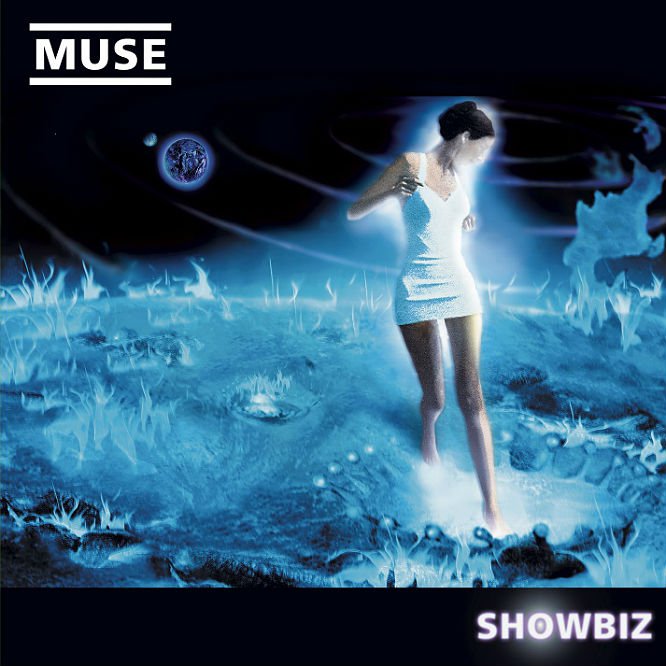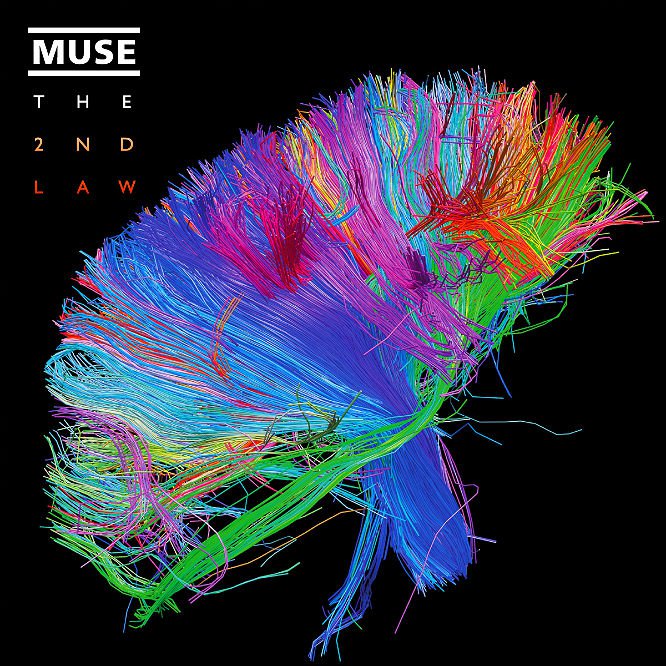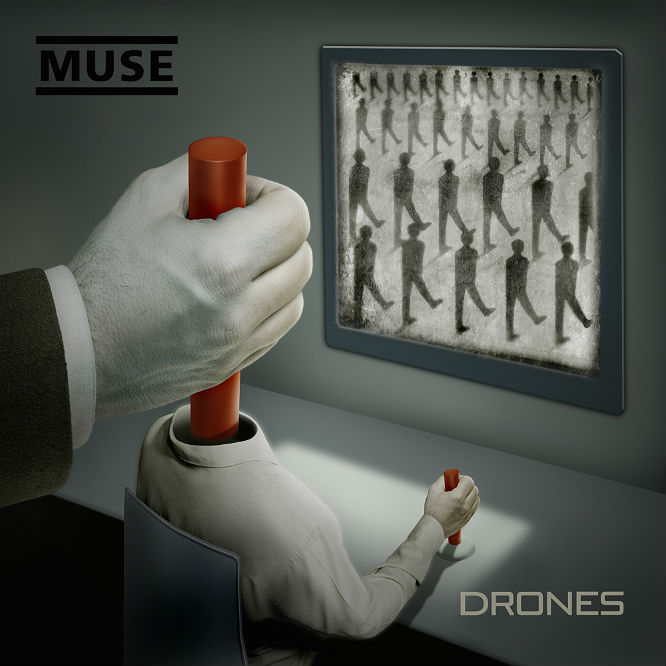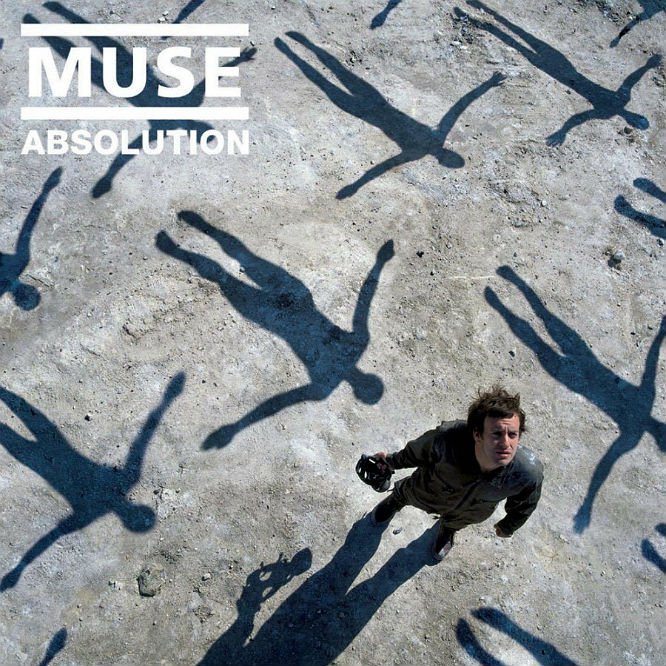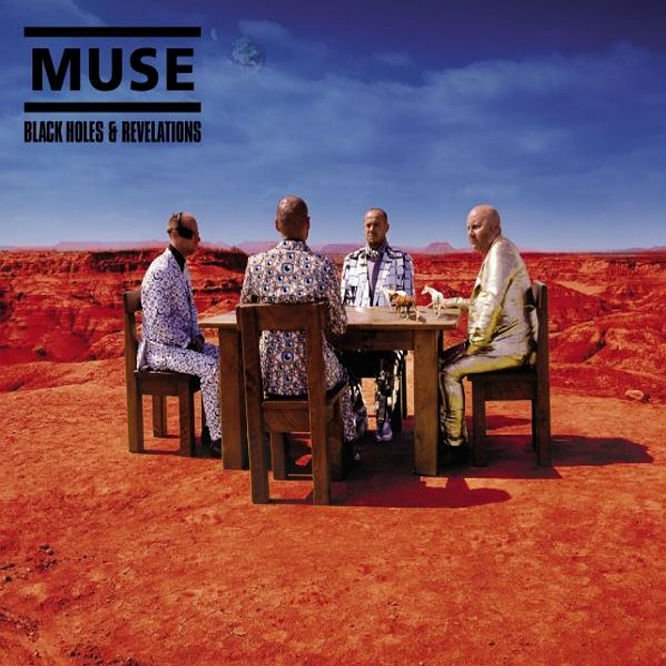'Dead Inside'
A menacing stomper that sets the tone for all that follows - a mechanical military beat underlies a pining and mournful tone, sonically calling upon the drones to overtake the vulnerable. Bellamy admits that the track is about "a relationship ending and a person becoming dead inside themselves", leading many to draw upon his split from Kate Hudson. Whether a direct influence it not, what we have here is Bellamy at his most unguarded and raw-nerved.
'Drill Sargent' + 'Psycho'
Alone and exposed to elements, our character is now open for the world to take advantage - and the future is murder.
Leaning on the louder, riff-based edge of their Origin Of Symmetry and Absolution days, the track is sure to please fans of their early work - not least because it's based on a riff that the band have been toying with live for a good 16 years. The result is a track built to be played live. Bellamy may have called it a 'cheap, trashy, riff', we call it 'pure rock pleasure' and an instant classic.
'Mercy'
"The opening line - ‘help me I’ve fallen on the inside' - is a reference to the protagonist knowing and recognising that they have lost something, they have lost themselves," says frontman Matt Bellamy of 'Mercy'. "This is where he realises that he is being overcome by the dark forces that were introduced to him in 'Psycho'." The Drones arc continues with something a little more heartfelt.
A driving and pulsing piano-led arena power-anthem, 'Mercy' seems to carry a similar feel to material from their Black Hole And Revelations era, albeit with a rejuvenated energy and very forward-looking approach. A close cousin to 'Starlight', it may turn up noses at first, but give it time and it shines as a pristine stadium gem.
'Reapers'
Murder comes home to roost as "home becomes a killing field" and the Drones tale sees faceless, deceitful powers turn the weak into killers on this fast and furious, guitar and rhythm-driven rush of aggression before a falsetto-lead and arena-ready chorus. It's almost a sequel to 'Stockholm Syndrome', but with a fire and personality of its own.
'The Handler'
Starting with a classic Muse searing riff with bone-shaking rhythms, 'The Handler' carries the solid space-rock heft of numbers from the Absolution era, akin to 'The Small Print', 'Fury' and 'The Groove'.
'JFK' + Defector'
The heavily politicised little beast begins with a legendary speech from John F Kennedy slamming the corruption of democracy through greed, before Bellamy howls "free, yeah I'm free," over a stomping Bowie-esque groove punctuated by some Queen anthemics, in a glam-metal call to arms with political descent and revolution. Lyrically hackneyed at moments, but one of the most surprising and idiosyncratic earworms on Drones - and a shock that we're eight tracks in and every one could be a single.
'Revolt'
A squelchy synth-fuelled call to arms and power ballad for the space-age, somewhere between Bryan Adams, Journey and Eurovision - yes, really.
'Aftermath'
A scorched Earth instrumental begins, not dissimilar from 'Wicked Game' by Chris Isaak or one of U2's less bombastic mombers, before Bellamy soberly sings of needing comfort and companionship, 'Aftermath' follows in the vein of 'Endlessly' - making for one of the more subtle and human numbers on the album. They prove when they tone it down, their class can really shine. It's almost spoiled by the outro solo and stadium climax.

'The Globalist'
The one that Muse fans have really been waiting for - the "crazy, ten minute prog nightmare" sequel to Origin Of Symmetry's 'Citizen Erased'. It's a high bar to match, as said track was the crowning centre-piece of their finest album to date - an operatic work of rock melodrama, an entire album packed into seven minutes, and a song rooted deep in the hearts of all Musers. How can this compare?
It starts with echoes of Black Holes And Revelations, as those Morricone-esque echoes of cinematic spaghetti Westerns return, while Bellamy mounfully stares down a falling dictator: "You were left unprotected to these wild and fragile lands."
Then, OOF - that riff kicks in, and Muse take us on a runaway rock ghost train. A countdown from ten begins, and a sweeping orchestra overlays a thrashy Muse - the calm before the storm. "There's no country left, to love and cherish - it's gone, it's gone for good," he croons, with a flick of Freddie Mercury and taking in Elgar's Nimrod, before the balladry peaks and the ultimate, lighters aloft, arena sway-along is born. It's not a complete reinvention, and is reminiscent of 'Hoodoo' and 'A Soldier's Poem' from Black Holes, nor is it quite the sequel you were promised. What we have instead again is another flourish-filled epic in the Muse canon, and certainly the beating heart of the album.

'Drones'
"Killed by drones," harp the band in unison, in an almost monk-like Gregorian chant, for three minutes, listing the various family members killed by drones, and singing of our age where you can kill from the safety of your home with drones. A fun game for this album would be to drink along with every time you hear the word 'drones' - you would get absolutely off your burgers.
Verdict:
"I can say this - this album is our best album," said Bellamy of Drones earlier this year. "I haven't been able to say that for a while". We were also told of a 'back to basics' approach, returning to the rocky and heavy core of the band, with the hint of a lean towards the Origin Of Symmetry days.
While it may not be their best work, it's a work of hard rock, operatic melodrama - consider it 'the best of Muse', in the sense that it runs in the vein of all that makes this band great, despite not reaching the highest heights of their true brilliance. It strips away many of the bells, whistles and unnecessary flambouyancies picked up during The Resistance and The 2nd Law, sounding more like the trashy three-piece you fell in love with way back when, but naturally loaded with enough extravagance to make it loveably ridiculous.
Its peaks are many and loaded, with most tracks eligible as singles, perhaps future Muse classics should time dictate it so. They were a band born to fill stadia, so naturally this is an album written to be played live - but don't be mistaken into thinking that this is not a true 'album'. It's held together by far more than just a concept. Drones is by far their most consistent, focussed and complete work since Black Holes And Revelations - a listen of good, old-fashioned, bat-shit rock fun.




